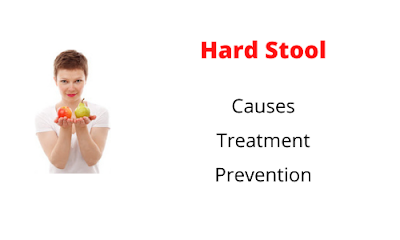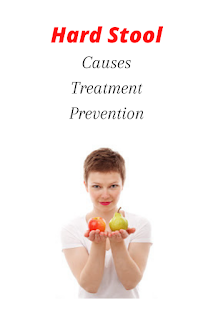Hard Bowel Movement
Causes of Very Hard Stool
Treatment & Prevention of Very Hard Stool (Naturally)
Drink Plenty Of Water
Water is very important for our health. It just not only makes our skin good but it's also good for our overall health. Dehydration in the colon causes hard bowel movement so drinking plenty of water makes the bowel work properly. When our body is hydrated, less water withdraws from the colon thus fewer chances of hard stools. Drinking warm water could make bowel movements regular.Eat Prunes
Prunes are really good for treating hard poops as they contain sorbitol (a natural laxative). Sorbitol has the property of passing through the body undigested. It draws water into the gut so as to bulk up the stool. Eating prunes can also help to lose weight by stimulating bowel movements. If you take 3-4 prunes in the morning and night then you can easily see the difference. It has insoluble fibre which helps your bowel to function properly. If you can't find whole prunes then can buy prune juice. 100 grams of juice contains 6.1 grams of sorbitol.Apple, Pear, and Cucumber Diet
In the Morning do breakfast with 1 apple, 2 pears, and a half cucumber daily. These fruits just not only make skin good but also help in softening hard stools. Apple, pear, and cucumber have much fibre in their edible skin so they are best for a hard bowel movement.Exercise
Be more active and add 20 minutes of daily exercise to your routine. You can walk, run, swim, or go cycling. You can even do yoga or exercise at home. Walking for just 20-30 minutes could stimulate bowel movement.Abdominal massage
Difficulty Passing Stool but Not Constipated
Experiencing difficulty passing stool doesn’t always mean you are constipated. While constipation is often defined by infrequent bowel movements or hard, dry stools, some people experience normal bowel movement frequency yet still struggle with the act of passing stool. This can be confusing and frustrating, but it is not uncommon. Understanding the possible causes can help identify the right approach for relief.
Common Causes
1. Pelvic Floor Dysfunction:
One of the leading causes of difficult defecation despite regular bowel habits is pelvic floor dysfunction. The pelvic floor muscles, which support the rectum and aid in bowel movements, may not coordinate properly. In some cases, people involuntarily contract rather than relax these muscles when trying to pass stool, making elimination difficult even if the stool itself is normal in consistency.2. Anal Fissures or Hemorrhoids:
Small tears in the skin around the anus (fissures) or swollen blood vessels (hemorrhoids) can cause pain or fear of pain during bowel movements. This discomfort can make someone subconsciously resist the urge to pass stool, leading to straining or a feeling of incomplete evacuation.3. Psychological Factors:
Stress, anxiety, and past negative experiences with painful bowel movements can lead to a form of psychological resistance. This is especially common in people who have experienced trauma or chronic pain during defecation.4. Rectocele or Rectal Prolapse:
In women, a rectocele occurs when the rectum bulges into the vagina due to weakened pelvic muscles, making it hard to fully evacuate stool. Similarly, rectal prolapse—a condition where the rectum slips down—can physically obstruct normal bowel movement.5. Incomplete Evacuation or Dyssynergia:
Sometimes, people feel like they haven’t fully emptied their bowels even after a bowel movement. This could be due to dyssynergic defecation, where muscles do not work in harmony to allow for complete elimination. This isn’t constipation but a functional issue with bowel mechanics.Signs It's Not Constipation
-
You have bowel movements regularly (at least three times a week)
-
Your stool is soft or normal in consistency
-
You still feel a need to strain or have difficulty with evacuation
-
There is no sense of prolonged absence of bowel activity, but discomfort remains
What Can Help?
1. Pelvic Floor Physical Therapy:
Targeted therapy can retrain the pelvic muscles to relax and contract properly. Biofeedback therapy is especially effective in teaching patients how to coordinate muscle movements.2. Dietary Adjustments:
While fibre is often recommended for constipation, in this case, overdoing fibre can sometimes worsen symptoms. A balanced intake, with adequate hydration, helps maintain stool softness without adding bulk that could increase straining.3. Toileting Posture:
Using a footstool to elevate your feet (like a squatty potty) can align your rectum more naturally, making stool passage easier.4. Medical Evaluation:
If this issue persists, it is important to see a doctor. Conditions like rectal prolapse, neurological disorders, or even obstructive lesions need professional assessment.Difficulty passing stool despite not being constipated can stem from a variety of structural, muscular, or psychological issues. It's important not to ignore this symptom, especially if it becomes chronic. With the right diagnosis and support—ranging from physical therapy to lifestyle changes—relief is very possible.
Are you on Pinterest? I have a board on 'Beauty & Health Tips' that you may like. For updates, you can check my Facebook page 'Health & Beauty Tips'. |



Comments
Post a Comment